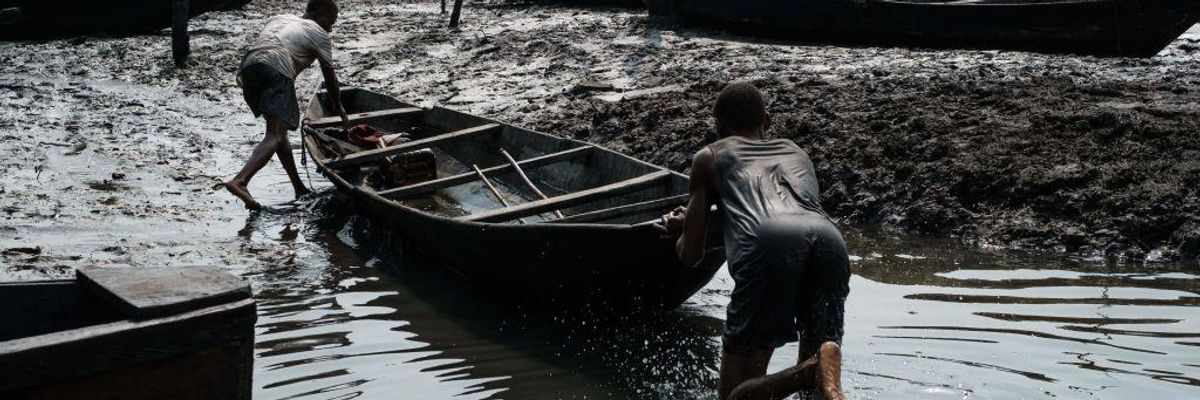Unveiling a new report on the devastating impacts of pollution, a United Nations expert on Thursday called for "urgent and ambitious action" to ensure that everyone on the planet experiences "a safe, clean, healthy, and sustainable environment."
"Pollution and toxic substances affect the enjoyment of many human rights, especially the right to a clean, healthy, and sustainable environment."
"The world is plagued by unconscionable environmental injustices, including 'sacrifice zones,' where communities are exposed to extreme levels of pollution and toxic contamination," says the report. "Employing rights-based approaches to detoxify people's bodies and the planet will require systemic and transformative changes to environmental law."
"States and businesses must vigorously pursue zero pollution and the elimination of toxic substances, rather than merely trying to minimize, reduce, and mitigate exposure to these hazards," the report adds. "Prevention, precaution, and nondiscrimination must be the paramount principles in environmental policymaking."
The document--which David Boyd, the special rapporteur on human rights and the environment, presented to the U.N. Human Rights Council (HRC)--points out that pollution and toxic substances cause at least nine million premature deaths each year.
"They also raise the risks of cancer, heart disease, stroke, respiratory illnesses, adverse effects on the immune, endocrine, and reproductive systems, birth defects, and lifelong negative impacts on neurological development," Boyd said in a statement.
"Yet, hundreds of millions of tons of toxic substances continue to be released into air, water, and soil annually," he continued. "Pollution and toxic substances affect the enjoyment of many human rights, especially the right to a clean, healthy, and sustainable environment, but also the rights to life, health, water, food, housing, and an adequate standard of living."
In a "historic" 43-0 vote last year--with just China, India, Japan, and Russia abstaining--the HRC formally recognized the right to a safe, clean, healthy, and sustainable environment. However, as Boyd and his report emphasized, many communities around the world, particularly those that are poor and otherwise marginalized, never experience such an environment.
Related Content
In 'Historic' Vote, UN Human Rights Council Recognizes Right to Clean Environment
Jake Johnson
"The disturbing phenomenon of being more heavily affected by pollution is called environmental injustice," he explained. "It is deeply distressing to see that clusters of the most heavily polluting and hazardous facilities, such as open-pit mines, smelters, petroleum refineries, chemical plants, and garbage dumps tend to be located near these disadvantaged communities."
The report points to over 60 sacrifice zones around the world, from oil pollution in the Niger Delta and intense smog in New Delhi to mining and smelting in the Russian city Norilsk and refineries and petrochemical plants in Louisiana's "Cancer Alley."
Boyd said that "while it is encouraging that there are good practices in both preventing future environmental injustices and remediating some sacrifice zones, many disturbing situations and related human rights violations remain unaddressed."
The HRC resolution from October "should mark a turning point in society's approach to pollution and toxic substances," the expert argued. "The creation of sacrifice zones must be prevented and urgent action must be taken to prevent pollution, remediate contaminated sites, and provide medical treatment in such zones."
In an interview with The Guardian, Boyd called on governments to target corporate polluters with strict regulations and end an estimated $1.8 trillion in subsidies for harmful industries.
Fossil fuel companies are not "going to voluntarily stop producing oil and gas; big coal companies are not going to voluntarily shift from being big coal companies to being big solar and wind companies," he said. "Governments have to do that. That's their job. It's governments that have the obligations to respect, protect, and fulfill our human rights."
Boyd, in his statement, highlighted that "a human rights-based approach to preventing exposure to pollution and toxic chemicals could save millions of lives, improve the quality of life for billions of people, and save trillions of dollars."
"Achieving a nontoxic environment is a human rights obligation," he said, "not an option."





